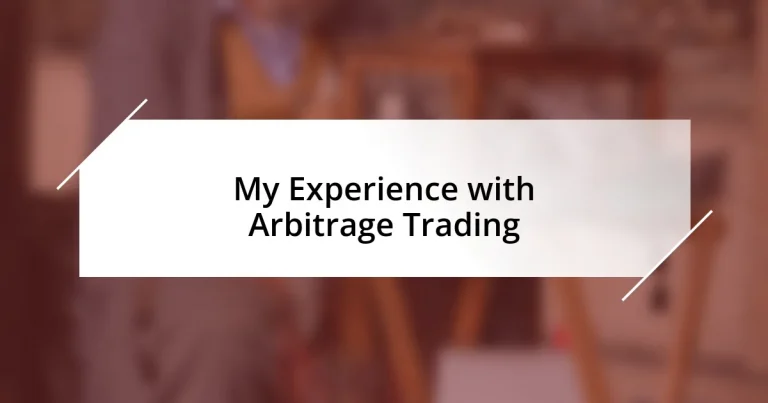Key takeaways:
- Timing and quick decision-making are crucial in arbitrage trading to capitalize on fleeting price discrepancies.
- Utilizing specialized tools and platforms, such as real-time data feeds and reliable brokerages, enhances trading efficiency and success.
- Maintaining detailed records and a solid risk management strategy helps in tracking performance and minimizing losses.
- Engaging with a trading community fosters learning and provides support, enriching the trading experience.
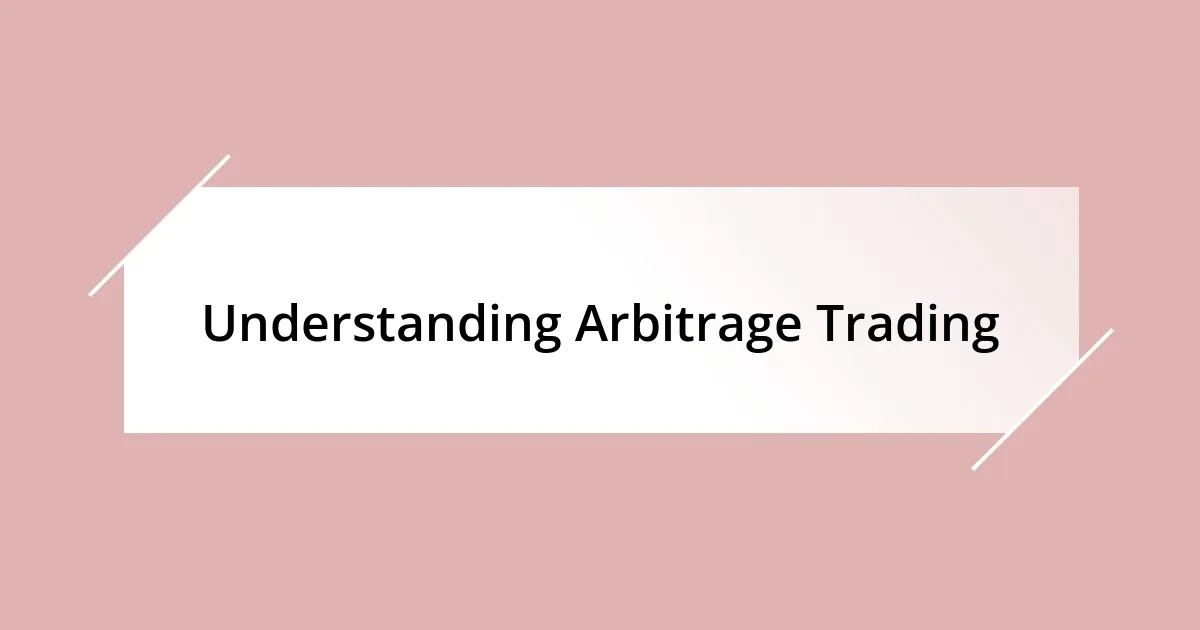
Understanding Arbitrage Trading
Arbitrage trading is fascinating to me because it’s like a financial treasure hunt. It involves identifying price discrepancies across different markets or platforms and exploiting them for profit. For example, I once noticed a significant difference in the price of a stock listed on two exchanges—buying on the cheaper exchange and selling on the more expensive one felt like capturing gold in a vast sea of opportunities.
When I first started with arbitrage, I was both excited and nervous. The idea that you could make money by simply taking advantage of price differences felt like magic. I remember sitting at my desk, staring at my screen, questioning how others could overlook such obvious gaps. It taught me that the key to success in arbitrage doesn’t just lie in swift execution; it’s also about having a sharp eye to spot those fleeting opportunities.
As I delved deeper into this strategy, I realized that timing is everything. Prices can shift in the blink of an eye, and one wrong move can turn potential profit into a loss. I often found myself asking—how do seasoned traders stay ahead of the game? The answer, I discovered, lies in continuous learning and adapting to market conditions. It’s not just a race against time, but also against an ever-evolving landscape of information.
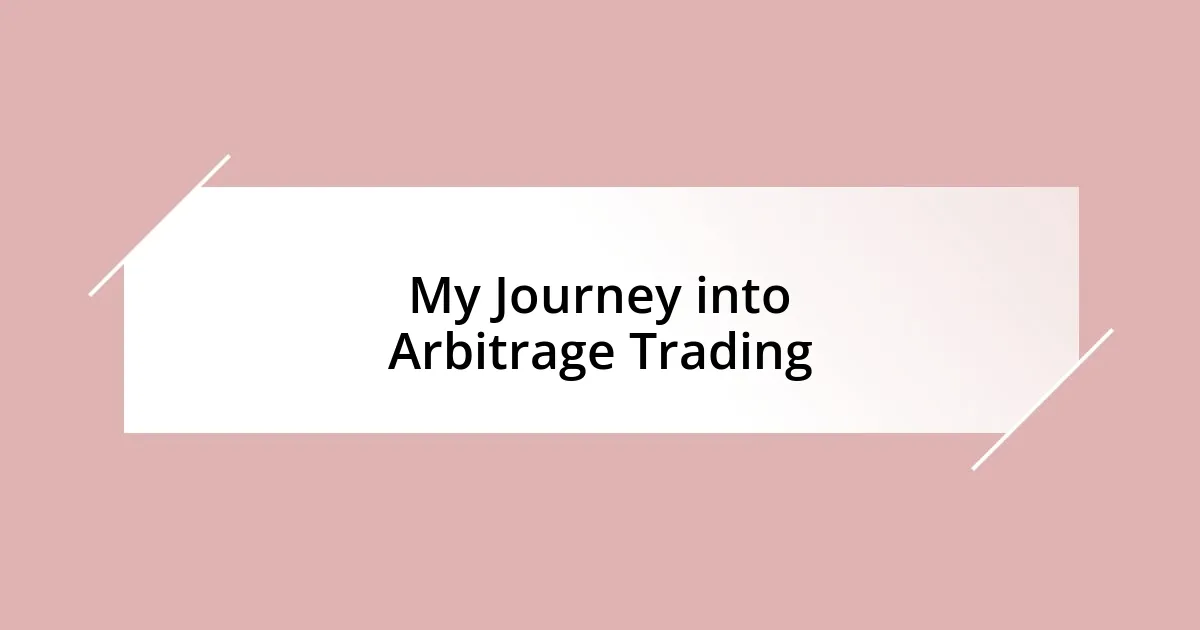
My Journey into Arbitrage Trading
As I navigated the world of arbitrage trading, I often felt like an explorer charting unknown waters. I vividly recall one instance when I discovered a unique arbitrage opportunity involving cryptocurrencies. I had rushed to my laptop one late evening, fueled by that thrilling mix of adrenaline and uncertainty, ready to make my move. With Bitcoin’s price dancing between platforms, I swiftly bought low on one exchange and sold high on another, and watching that profit appear felt like winning a small lottery. That moment reinforced a core lesson: the thrill of arbitrage is as much about quick thinking as it is about calculated risk.
Reflecting on my journey, I came to appreciate the importance of specialized tools and platforms that assist in identifying these opportunities. Here are some key aspects that significantly shaped my experience:
- Real-time data: Access to tools that provide live price feeds was essential in my endeavors.
- Market knowledge: Understanding different markets and their dynamics helped me make informed decisions.
- Risk assessment: I learned to assess the risks involved before committing to transactions to avoid costly mistakes.
- Community engagement: Joining forums and groups of traders boosted my knowledge and confidence.
- Patience and persistence: I realized that not every opportunity yields profit, but consistency pays off in the long run.
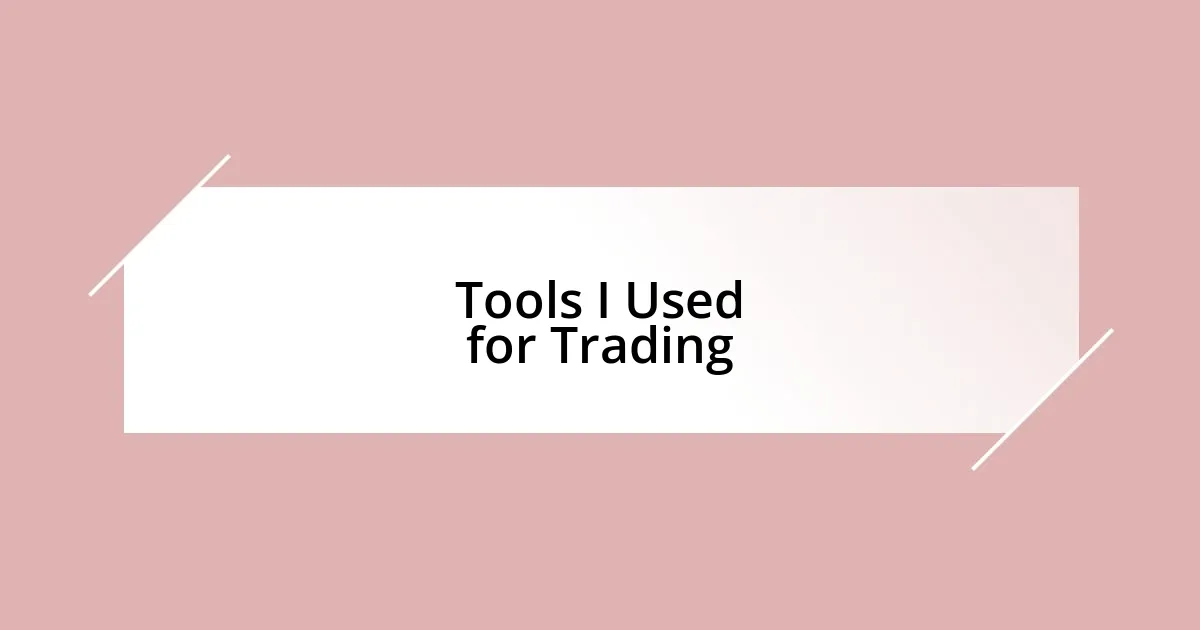
Tools I Used for Trading
When it comes to the tools I used for trading, I can’t stress enough how pivotal they were for my arbitrage success. First and foremost, I relied heavily on trading platforms that were user-friendly and equipped with advanced features, such as multiple charting tools. One night, I remember finding a specific software that offered customizable alerts, which proved vital. With those alerts in play, I was able to jump on price discrepancies the moment they appeared, saving me from missed opportunities that I’m sure would have led to some frustrated late-night regrets.
Another essential tool was a reliable brokerage that supported quick transactions. I recall the exhilaration of executing a trade right as the market dynamics shifted. It was thrilling to see my analysis bear fruit almost instantaneously. Coupled with a strong internet connection, this expedited my ability to make smart decisions at critical moments. Because, let’s face it—when you spot a great arbitrage opportunity, every second counts!
Finally, I found that utilizing spreadsheet tools to track my trades and analyze my performance was a game-changer. In the beginning, I didn’t realize how important this was, but after a few losses, it dawned on me. I started meticulously logging every trade, which helped me notice patterns and refine my strategies. I became more comfortable with the numbers and started seeing the bigger picture in my trading journey.
| Tool | Description |
|---|---|
| Trading Platform | User-friendly with advanced features for real-time trading. |
| Brokerage | Enables quick transactions; essential for timing. |
| Spreadsheet Tool | Helps track trades, analyze performance, and refine strategies. |
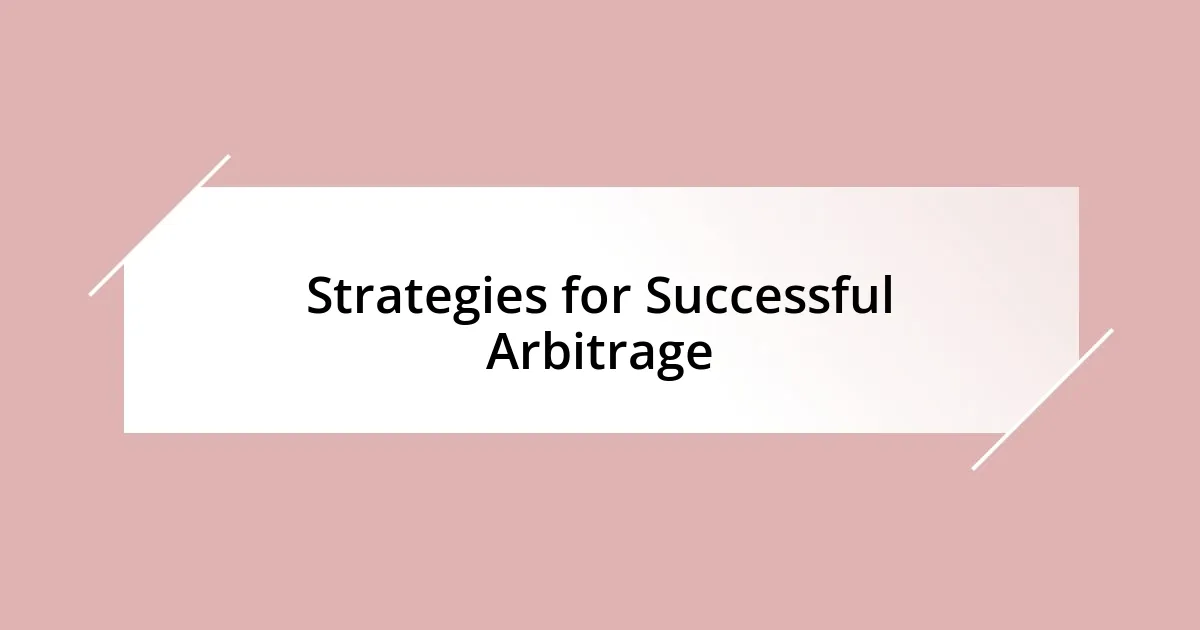
Strategies for Successful Arbitrage
When diving into arbitrage trading, I found that developing a keen eye for market trends was absolutely crucial. I remember one particular day when I spotted a price discrepancy in two stocks that seemed almost too good to be true. This taught me to stay alert and always question, “What might I be missing?” By constantly monitoring market movements, I could identify opportunities before they vanished.
An equally important strategy was mastering the art of timing. There were moments when I hesitated, and I paid for it dearly. I recall a situation where I delayed executing a trade by a mere few seconds because I overthought the risks. That experience reinforced the lesson: in arbitrage, speed can often mean the difference between profit and loss. It’s about striking while the iron is hot and having the conviction to act.
I also found that diversifying my arbitrage tactics significantly expanded my success. Initially, I relied on a single approach, but after engaging with fellow traders, I learned to explore different asset classes like forex and commodities. The excitement of adapting my strategies not only increased my chances of profit but also kept the trading journey fresh and thrilling. Have you ever ventured outside your comfort zone? For me, it turned out to be one of the most rewarding decisions in my trading path.
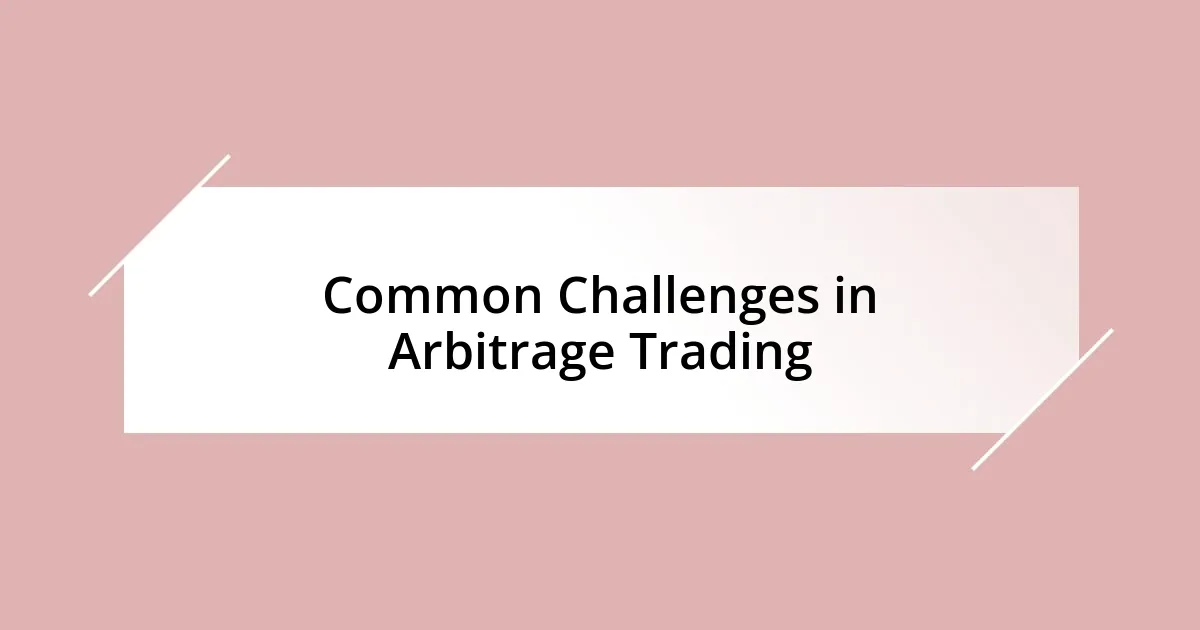
Common Challenges in Arbitrage Trading
When I first dove into arbitrage trading, one challenge that hit me was the speed of market changes. I vividly recall a time when I overlooked a price gap because I was gathering my thoughts, and moments later, the opportunity vanished. This experience taught me a harsh lesson about needing to stay sharp and quick on my feet—one glance away can mean losing out on profits.
Another significant hurdle was the emotional rollercoaster of trading, especially when dealing with substantial amounts. I remember sweating bullets during a volatile trading session, watching profits fluctuate wildly. It made me realize that keeping emotions in check is essential; otherwise, fear and greed can cloud your judgment. Have you ever been in a position where you let emotions sway your decisions? I definitely have, and it reinforced the importance of developing a disciplined mindset.
Lastly, I often faced the complexities of transaction costs cutting into profit margins. There were days when I executed what looked like a perfect arbitrage strategy, only to watch profits dwindle due to fees. This realization pushed me to assess every transaction critically and find ways to minimize costs—whether it was by negotiating better terms with brokers or staying aware of fee structures. It really made me appreciate how even little details can have a big impact in the world of trading.

Tips for Beginners in Arbitrage
When I first started my journey in arbitrage, one crucial tip I learned was the importance of maintaining meticulous records. I remember the unsettling feeling of scrambling to recall my trade history after a particularly hectic day. By keeping detailed notes on transactions, I not only tracked my gains and losses but also identified patterns in my trading behavior. Have you ever tried monitoring your progress closely? It’s enlightening and helps you make informed decisions.
Another piece of advice I’d share is the necessity of having a solid risk management strategy. Early on, I took on trades that were too large for my comfort zone, which left me feeling anxious and second-guessing myself. Now, I advocate for setting strict limits on how much capital I’m willing to risk per trade. This mindset shift not only calms my nerves but also lets me enjoy the trading experience without the constant worry of significant losses looming over my head.
Lastly, I encourage beginners to engage with a trading community. Initially, I felt isolated in my trading endeavors, but once I connected with fellow traders, everything changed. They shared invaluable insights and experiences, allowing me to learn from their mistakes and successes. Have you found a supportive network in your pursuits? Being part of a community can be inspiring, motivating, and quite frankly, fun!
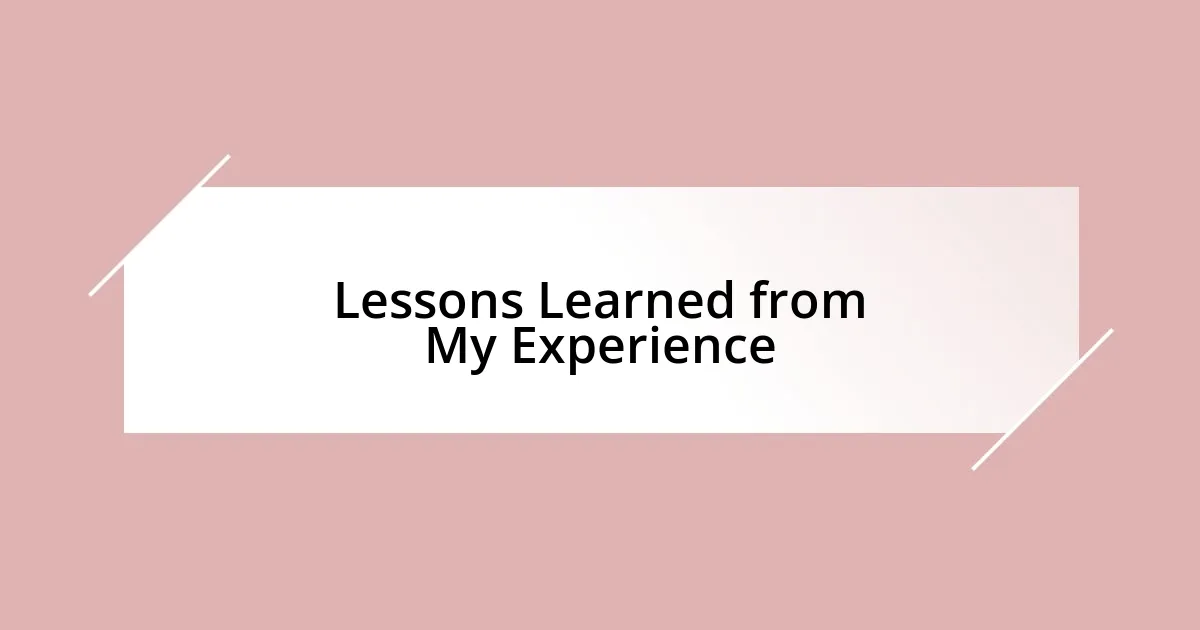
Lessons Learned from My Experience
When reflecting on my experiences in arbitrage trading, one of the most eye-opening lessons was the critical importance of timing. There was a moment I’ll never forget: I happened to be on a brief break when a significant market shift occurred, costing me a lucrative trade. This taught me that being present and constantly monitoring the market is non-negotiable—distractions can be the thief of opportunity. Have you ever felt the sting of a missed chance simply because you weren’t paying full attention? I certainly have.
Another valuable insight came from understanding the necessity of adaptability. Early on, I was so focused on sticking to my strategies that I ignored changing market conditions. It was a frustrating lesson when an otherwise solid plan floundered because I failed to pivot. Now, I embrace flexibility; I’ve learned to evaluate and adjust my strategies quickly. Isn’t it fascinating how adaptability can turn potential disasters into opportunities? I’ve experienced that shift firsthand.
Lastly, I learned to appreciate the power of data analysis. In the beginning, I often relied on gut feelings rather than solid data, which led to several disappointing trades. I vividly remember one week, where every decision based on instinct resulted in losses. It was a turning point for me, leading to a newfound respect for analytical tools and software. Now, diving into the numbers helps me make informed decisions, so I’d ask you: how do you evaluate your trading data? Embracing a data-driven approach has transformed my trading experience for the better.












